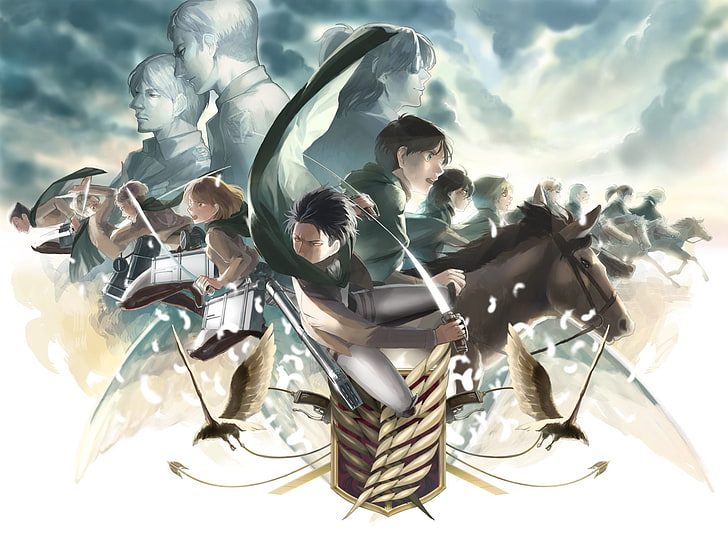Attack On Titan: The Story So Far
December 19, 2020
It is quite rare to see a show nowadays to consistently one-up itself each season as each new piece of the story adds more depth and nuance to itself. A show like Attack on Titan (AOT) only comes every so often to wow its audience and also shame the ones that didn’t choose to keep up with its immaculate story written by Hajime Isayama. Attack on Titan is an anime about humanity forced on the brink of extinction due to man-eating humanoid creatures called Titans but are safeguarded by giant fifty-meter walls that prevent the Titans from entering the final frontier for humanity’s survival. With the final season of Attack on Titan finally airing, it’s time to reflect on what the previous three seasons did to capture how despairingly beautiful the story is. I will refrain from spoiling aspects of the story but expect there to be a handful.
Season One
The first season of AOT can best be compared to a rollercoaster; it is just a constant exhilarating rush of action with little to no time at all to react to it. Some of the season’s strongest aspects are world-building and those crazy action sequences. The problem with that analogy however is that the show ends up just being another thrill ride and nothing more. Sure, it was fun while it lasted, but that is all there is to it. That is not to say that it was bad as it was a very enjoyable time watching it, but you’re left with no real care for a majority of characters introduced.
The first couple of episodes are the best parts of this season. Episode one sets the stage of the world of AOT and how the Titans have impacted humanity emotionally, economically, technologically, and socially. We learn about the motivations of main characters Eren Jaeger, his adopted sister Mikasa Ackerman, and their best friend Armin Arlet and it becomes clear that no one in their lifetime has ever seen what an ocean or desert is since they’ve been stuck inside the walls for so long. Then the episode ends with one of the best jaw-dropping moments in the series as a whole: One of the walls has collapsed and now Titans are entering human territory. This and the second episode sets the tone beautifully as it establishes that the world is a cruel place and will never throw a bone for you. It also serves to show the audience that things will not end smoothly and to expect happy things to happen is only wishful thinking. There are no good outcomes, only bittersweet and disastrous.
The problems really start to show themselves around episode 3 and 4 of the show. While not necessarily bad in terms of content being given, the season’s biggest problems are the slow pacing of the story and lack of character development. Ironically, despite how much action is thrown at you with a plot twist being added quite frequently, the episodes themselves are actually quite slow in delivering that to you. The conflict in some episodes feels like it easily can be resolved in either ten minutes or in just a single episode depending on the situation. As well, so much of that character development goes straight to the main trio that it feels like the rest of the cast outside of Eren’s rival Jean are just there to be introduced and killed off later or stay one-note throughout the season.
I think season one does a great job laying the groundwork for what’s to come later on in the series and bringing with it memorable moments, but analyzing it as a standalone series it suffers from choosing to focus on the thrills and fear presented to the audience over developing its characters. I give it a 6.8/10.
Season 2
Remember all those problems that I mentioned in Season 1? Well, all of that is thrown out the window because you are spoon-fed all the great things of that season along with great character development, better pacing, and a far more interesting plot than before.
This season is not at all filled with as much action as the previous one. However, this actually gives the season an advantage since now we get to explore the rest of the cast and their motivations for doing the things they are doing. Characters like Sasha Braus go from being simple, one trait characters, to complex ones that show us just why she cares about the things she does. On the flip side, characters like Connie Springer just get more things to do and they stop feeling like minor, background characters to actual people that genuinely feel like they impact the story in some way. All these things get spotlighted so much that the main characters are barely in the season at all with them only really coming back as the focus in the last couple of episodes in the season. This is a positive since they essentially carried the majority of season one and have had plenty of development to where Hajime Isayama can put them on the back burner for now.
To say the quality of the story has improved is a major understatement. As mentioned before, we get to see characters–new and old–take the stage and see how they interact with one another. While in the previous season the story tended to be driven by new revelations and plot twists, this season is a textbook definition of a character-driven story. People are forced into scenarios where the wrong choices can lead to disastrous consequences. Take, for example, the members of the 104th Training Corps (Recruits that will eventually go into specialized branches of the Wall’s military force) forced to reside in an abandoned castle that becomes surrounded by Titans. A single wrong move can lead to them dying, so it leads to such intense and genuinely suspenseful moments that leave you caring for characters that you more than likely didn’t care for originally or didn’t even remember. As well, there are some plot twists, but they are used sparingly and actually help to add more mystery to the world of AOT. In season one we learn of the existence of Titan Shifters (People who can transform into a Titan, maintain their consciousness, and revert back to a human at will), but it is elaborated far more and it becomes apparent that these Shifters didn’t originate inside the walls and that their is several of them than originally assumed.
Things like this just elevates the overarching story of AOT and while it may not be packed with elaborate action sequences or non-stop thriller, it definitely makes it more interesting. I give season two a 8.5/10
Season 3
The absolute crown jewel of AOT, season three takes every single little thing you loved and enjoyed about everything thus far and cranks it up to eleven. The story, the characters, the action, the suspense, all of it is done exceptionally well that it’s hard to believe you’re watching the same show as before.
The first half of Season 3 is honestly nothing genre-defining for anime and storytelling, but like season two it is how the characters react to the circumstances they are forced to be in. Ironically, the first handful of episodes stops being about killing Titans and actually becomes very political and about killing other humans. From a writer’s standpoint, this makes perfect sense to take this evolution in your story. Of course, there will be politics in their world, quite an unfair system of politics, and of course by eventually going against the grain, there will be powerful people willing to silence them. It helps keep the story fresh and adds a new layer of depth that asks more questions. “Who is really the bad guy? What’s happening behind the scenes? Who should be trusted?”. It’s questions like these that really just suck you into the horrifying world of AOT and that it isn’t the Titans that are the nightmare.
Now, the second half is where this show can arguably be considered a modern classic. Take the action-packed thrill ride of season one, the emotional complexity of the second, and the severity of the situation of the first half of season three and you get part two of Season 3. You are almost quite literally at the edge of your seat fearing which beloved character will live to see the next episode. Deaths have real consequences that can destroy the entire goal that is set during the second half that leaves the audience with suspense as to what will happen with each new life gone decreasing their chances to win their fight against the Titans. We see how much despair each character, relevant or not, feels knowing that every single glimmer of hope they find is dashed away. Each new choice created makes another worse outcome. The only choice they really have is to simply survive. All this for humanity, but at what cost?
Season 3 is a culmination of all the best things AOT had to offer and somehow manages to make the end product be better than all the individual aspects of the previous seasons. This is an easy 9.5/10.
Final Thoughts
Overall, AOT, while it started as a fun but forgettable roller coaster, it ends as a fleshed-out, terrifyingly beautiful work of fiction. It will be hard to top the second half of season 3, but considering just how well written the show is, I have no doubt in my mind the final season will define AOT as a modern classic. You can watch the anime using the anime streaming service CrunchyRoll and it is rated TV-MA.

